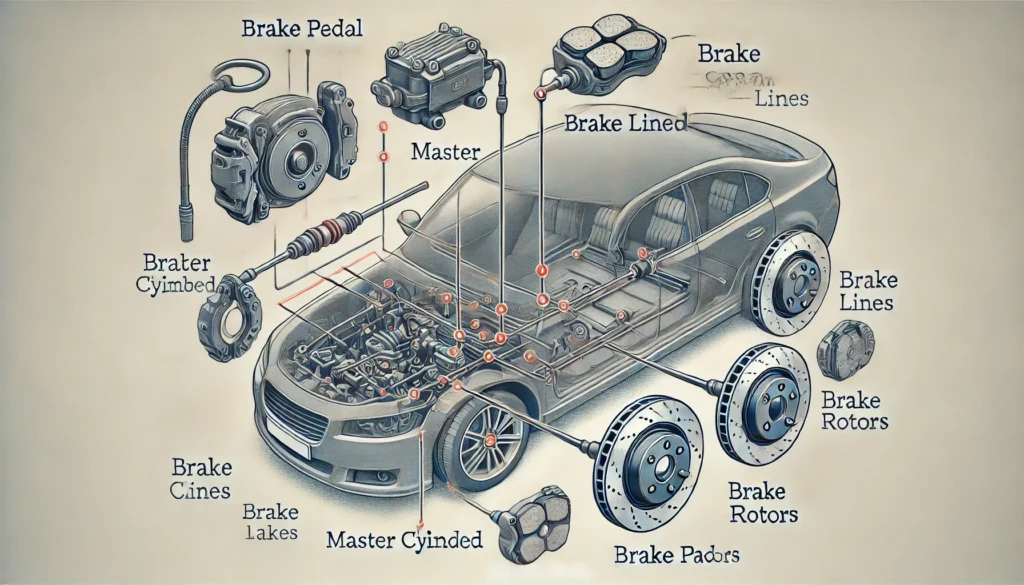The brake system is one of the most critical components of any vehicle, directly influencing its safety and performance. When a brake system fault occurs, it can significantly impact driving performance, compromising your ability to stop effectively and safely. Understanding these effects is essential to maintaining your vehicle and ensuring your safety on the road.
Understanding the Brake System
The brake system is composed of several key components that work together to slow down and stop the vehicle:
- Brake Pedal: The driver applies force to this to initiate braking.
- Master Cylinder: Converts mechanical pressure from the brake pedal into hydraulic pressure.
- Brake Lines and Hoses: Transmit the hydraulic fluid to the brake calipers.
- Brake Calipers: House the brake pads and use hydraulic pressure to press the pads against the rotors.
- Brake Pads: Create friction against the rotors to slow down the vehicle.
- Brake Rotors (Discs): Rotating discs that the pads clamp onto to create friction.

Impact of a Brake System Fault on Driving Performance
- Reduced Braking Efficiency:
- Effect: A fault in the brake system, such as worn brake pads or low brake fluid, can significantly reduce braking efficiency. This means the vehicle will take longer to stop, increasing the risk of collisions, especially in emergency situations.
- Scenario: If your brake pads are worn, you may find that you need to press the brake pedal harder and further to achieve the same stopping power, which can be dangerous in sudden stop scenarios.
- Increased Stopping Distances:
- Effect: Brake system faults can lead to increased stopping distances. This can be particularly hazardous in situations requiring sudden stops, such as avoiding an obstacle or reacting to another driver’s sudden brake.
- Scenario: A leaking brake line reduces hydraulic pressure, meaning less force is applied to the brake pads. This results in the vehicle taking a longer distance to come to a complete stop.
- Loss of Brake Pedal Feel:
- Effect: Air in the brake lines or a failing master cylinder can cause a spongy or soft brake pedal feel. This makes it difficult to gauge how much pressure to apply, leading to inconsistent braking performance.
- Scenario: A spongy brake pedal can make it challenging to stop the vehicle smoothly and predictably, increasing the risk of jerky stops and potentially causing accidents.

- Brake Fade:
- Effect: Overheating brakes, often caused by excessive braking or driving in mountainous areas, can lead to brake fade. This reduces the braking power as the brake components cannot dissipate heat effectively.
- Scenario: During a long downhill drive, the brakes may start to feel less responsive and require more force to slow the vehicle, which can be dangerous if the driver needs to stop suddenly.
- Uneven Braking:
- Effect: Faulty brake calipers or unevenly worn brake pads can cause uneven braking, where one side of the vehicle brakes more forcefully than the other. This can lead to loss of control, especially at higher speeds.
- Scenario: Uneven braking can cause the vehicle to pull to one side when braking, making it difficult to maintain a straight line and increasing the risk of veering into another lane or off the road.
Steps to Address Brake System Faults
- Regular Inspections:
- Conduct regular inspections of the brake pads, rotors, calipers, and brake fluid levels to catch any issues early before they become serious problems.
- Timely Maintenance:
- Replace worn brake pads and rotors promptly. Ensure brake fluid is topped up and free from contamination. Bleed the brake lines to remove air pockets.
- Professional Assistance:
- If you notice any signs of brake system faults, such as squeaking noises, a soft brake pedal, or increased stopping distances, consult a certified mechanic. They have the expertise to diagnose and repair complex brake issues.
Conclusion
A fault in the brake system can severely affect driving performance by reducing braking efficiency, increasing stopping distances, and causing uneven braking. Regular maintenance and prompt attention to any signs of brake problems are crucial to ensure your vehicle remains safe and reliable. By understanding the impact of brake system faults and taking appropriate action, you can maintain optimal vehicle performance and safety.